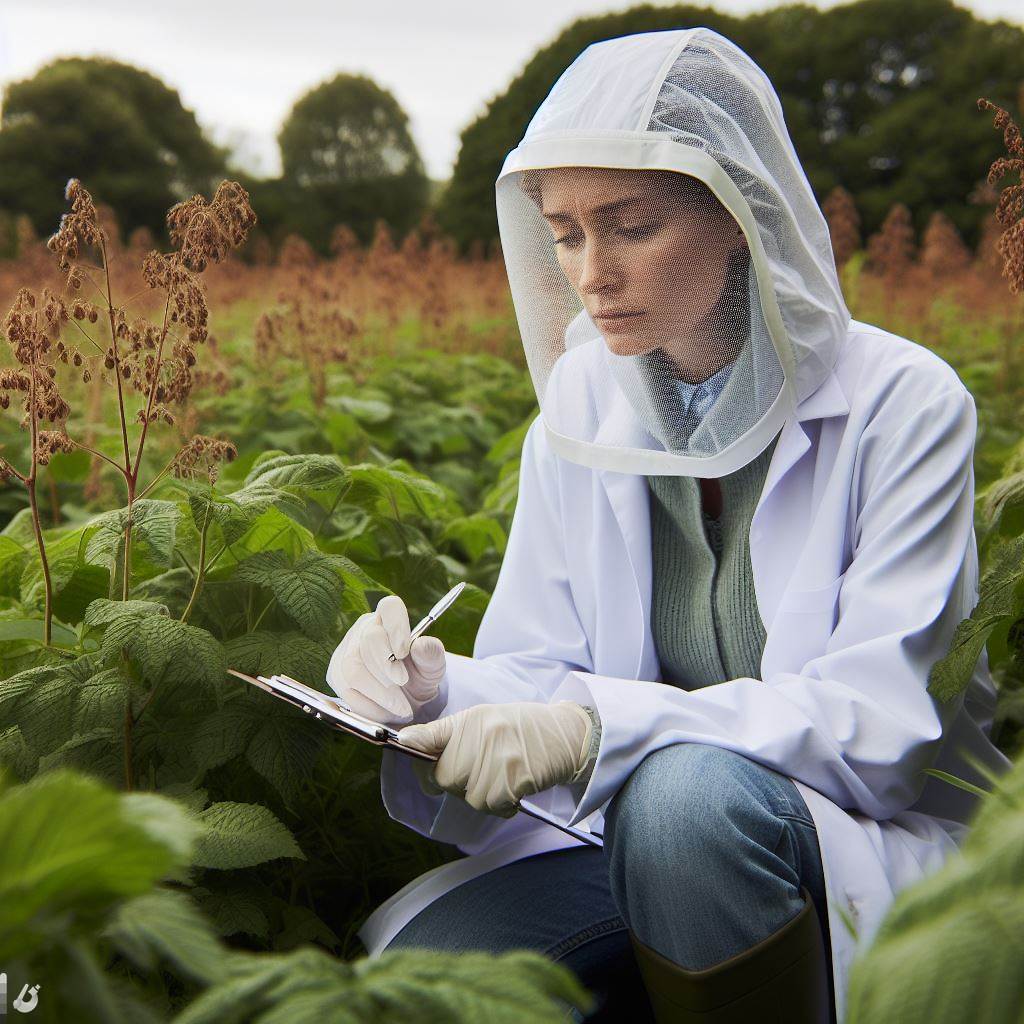Introduction
Environmental scientists, the guardians of our planet, hold a crucial role in addressing the complex tapestry of environmental challenges, both at home in the UK and on a global scale.
As we embark on this exploration, it’s vital to comprehend the multifaceted responsibilities inherent in their roles.
These dedicated professionals are not only custodians of local ecosystems but also contributors to the broader global dialogue on environmental sustainability.
In this blog post, we aim to dissect and compare the nuanced roles of environmental scientists in the UK and across the world.
From community-based initiatives to shaping international environmental policies, these scientists navigate a diverse terrain.
As we delve into their tasks, we’ll uncover how these roles adapt to the unique challenges posed by local contexts while simultaneously contributing to global environmental conversations.
Join us in unraveling the intricate tapestry of responsibilities shouldered by environmental scientists.
Understanding their impact, and appreciating the dynamic nature of their roles in different geographical settings.
Qualifications and Skills
When it comes to becoming an environmental scientist in the UK, there are specific education and training requirements that need to be met.
Additionally, there are degree programs and certifications available to enhance one’s knowledge and skills in this field.
Furthermore, certain skills are necessary for a successful career as an environmental scientist.
Such as a good understanding of environmental laws and regulations, proficiency in data analysis, and experience in fieldwork.
Education and Training
- To become an environmental scientist in the UK, a minimum of a bachelor’s degree in environmental science or a related field is usually required.
- Other acceptable degrees for this profession include chemistry, biology, geology, or ecology.
- Some universities may also offer specialized environmental science programs with a strong focus on sustainability and conservation.
- Additionally, obtaining a master’s or doctoral degree in environmental science can provide a competitive edge and open up more advanced career opportunities.
Degree Programs and Certifications
- A variety of degree programs are available in the UK for individuals interested in pursuing a career as an environmental scientist.
- These programs often cover a wide range of topics, including ecology, pollution control, climate change, and resource management.
- Some universities offer specialized courses in renewable energy, environmental policy, or environmental impact assessment.
- Moreover, there are professional certifications, such as the Chartered Environmentalist (CEnv) designation, which demonstrate expertise and commitment to the field.
Necessary Skills
- A sound knowledge of environmental laws and regulations is essential for environmental scientists working in the UK.
- Understanding the legal framework allows them to ensure compliance and advocate for environmentally friendly practices.
- Data analysis skills are also crucial as environmental scientists need to collect, organize, and interpret data from various sources.
- Proficiency in statistical analysis software and geographic information systems (GIS) is often required.
- Fieldwork experience is highly valued as it provides practical knowledge of ecosystems, sampling techniques, and environmental monitoring.
In review, to become an environmental scientist in the UK, a strong foundation of education and training in environmental science or related fields is necessary.
Degree programs and specialized certifications enhance knowledge and skills, while proficiency in environmental laws, data analysis, and fieldwork is vital for success in this profession.
Job Opportunities in the UK
Various sectors where environmental scientists work in the UK
Environmental scientists in the UK have a wide range of sectors to choose from. They can work in industries such as:
- Energy and utilities
- Renewable energy
- Waste management
- Water and wastewater treatment
- Environmental consulting
- Conservation and biodiversity
- Agriculture and farming
- Transportation
- Government agencies
- Non-profit organizations
Specific roles, such as working for government agencies, environmental consultancies, or non-profit organizations
1. Working for government agencies
An environmental scientist can work for government agencies such as the Environment Agency, where they would be responsible for monitoring and enforcing environmental regulations.
2. Working for environmental consultancies
Environmental consultancies hire environmental scientists to conduct assessments and provide advice on environmental impact assessments, pollution control, and waste management.
3. Working for non-profit organizations
Non-profit organizations like Greenpeace or Friends of the Earth employ environmental scientists to research, campaign, and advocate for environmental issues.
Overview of the demand for environmental scientists in the UK
The demand for environmental scientists in the UK is significant and expected to increase in the coming years.
Reasons for the high demand include:
- Increasing awareness of environmental issues
- Implementation of stricter environmental regulations
- Growing emphasis on sustainable development
- Rise in renewable energy projects
- Need for effective pollution control and waste management
Additionally, the UK government has set ambitious targets for reducing carbon emissions and achieving net-zero by 2050, which will require the expertise of environmental scientists.
The demand is also driven by the need for research and data analysis to understand and mitigate the impacts of climate change on the environment and society.
As a result, environmental scientists in the UK can expect a wide range of job opportunities and career growth.
Read: Remote Work: A New Era for UK Chemists
Job Opportunities Globally
Environmental scientists play a crucial role in addressing global environmental issues. However, their role and job prospects may vary in different countries. Let’s explore how.
Exploration of how an environmental scientist’s role may differ in different countries
Environmental scientists are responsible for studying and finding solutions to various environmental problems. However, the specific tasks and focus of their work can vary from country to country.
Personalized UK Career Consulting
Receive tailored career guidance designed just for you. Get actionable steps and expert support to boost your career in 1-3 days. Take control of your career now.
Get Started- Environmental Policy Development: In the UK, environmental scientists often contribute to the development and implementation of environmental policies at both national and local levels.
- Research and Data Analysis: Globally, environmental scientists conduct research and analyze data to identify environmental issues, assess their impacts, and propose mitigation measures.
- Ecosystem Management: In countries with diverse ecosystems, like Brazil or Australia, environmental scientists may focus on conservation and management of specific habitats or endangered species.
- Climate Change Mitigation: With the increasing concern over climate change, many environmental scientists worldwide are working towards developing strategies to mitigate its effects.
Comparison of job prospects in different geographical locations
Job prospects for environmental scientists can vary significantly depending on the geographical location and the specific environmental challenges faced by each region.
- Developed Countries: In developed countries like the United States and Germany, there is a higher demand for environmental scientists due to stricter environmental regulations and well-funded research institutions.
- Developing Countries: Developing countries often face more severe environmental issues. Therefore, there may be increasing job opportunities for environmental scientists in these regions as their governments prioritize sustainability.
- Emerging Economies: Rapidly growing economies, such as China and India, have recognized the need for environmental expertise to balance economic development with environmental protection. This has led to a rising demand for environmental scientists.
Overall, job prospects for environmental scientists are generally positive worldwide due to the increasing global awareness of environmental issues and the need for sustainable development.
Introduction to global environmental issues where environmental scientists play a crucial role
Environmental scientists have a vital role in addressing various global environmental issues that threaten our planet’s well-being.
- Climate Change: Environmental scientists contribute to understanding the causes and impacts of climate change, as well as developing strategies to mitigate its effects.
- Loss of Biodiversity: Environmental scientists work towards conserving biodiversity, studying ecosystems, and finding ways to halt the loss of species and habitats.
- Air and Water Pollution: They investigate sources of pollution, monitor air and water quality, and propose measures to reduce contamination and protect human health.
- Sustainable Resource Management: Environmental scientists play a crucial role in promoting sustainable practices for managing natural resources like forests, water, and minerals.
- Waste Management: They develop efficient waste management systems, encouraging recycling, waste reduction, and safe disposal of hazardous materials.
By addressing these global environmental issues, environmental scientists contribute to building a more sustainable and resilient future for our planet.
In a nutshell, the role of environmental scientists and their job prospects can vary in different countries. However, their importance in addressing global environmental issues remains consistent.
Whether working on environmental policies, research, or conservation, environmental scientists play a crucial role in safeguarding our planet’s health and promoting sustainable development worldwide.
Read: Remote Work: A New Era for UK Chemists
Specific Environmental Challenges in the UK
- Identification of major environmental issues currently faced in the UK
- Overview of initiatives and policies in place to address these challenges
- Explanation of the environmental scientist’s role in tackling these issues
Environmental scientists play a crucial role in addressing the specific environmental challenges faced by the United Kingdom (UK).
As one of the most densely populated countries in Europe, the UK faces numerous environmental issues that require immediate attention.
In this section, we will explore the major challenges, the initiatives taken, and the role of environmental scientists in tackling these complex issues.
Identification of major environmental issues currently faced in the UK
The UK faces a range of environmental challenges, each posing significant threats to ecosystems and human well-being:
- Air pollution: High levels of air pollution, especially in urban areas, contribute to various respiratory and cardiovascular diseases.
- Climate change: Rising temperatures, extreme weather events, and sea-level rise are all consequences of global warming, affecting the UK’s coastline, agriculture, and infrastructure.
- Loss of biodiversity: Habitat destruction, pollution, and invasive species have led to a decline in native plants and wildlife populations.
- Water pollution: Industrial activities, agriculture, and inadequate wastewater treatment contribute to water pollution, especially in rivers and coastal areas.
- Waste management: The UK produces a significant amount of waste, and proper disposal and recycling practices are essential to prevent environmental contamination.
Overview of initiatives and policies in place to address these challenges
The UK government has implemented various initiatives and policies to tackle these environmental challenges:
- Air Quality Strategy: The government introduced measures to reduce emissions from industries, vehicles, and household sources.
- Climate Change Act: This legislation aims to reduce greenhouse gas emissions and transition to a low-carbon economy.
- Biodiversity Action Plan: The plan includes conservation efforts, restoration of habitats, and protection of endangered species.
- Water Framework Directive: The directive establishes a framework for the protection and improvement of water quality in rivers, lakes, and coastal waters.
- Waste Strategy: The UK government focuses on waste reduction, recycling, and promoting a circular economy to minimize waste generation.
Explanation of the environmental scientist’s role in tackling these issues
Environmental scientists play a vital role in addressing the UK’s environmental challenges through their expertise and research:
- Monitoring and assessment: Environmental scientists collect data and monitor air quality, biodiversity, water pollution, and climate change impacts.
- Research and analysis: They conduct studies to understand the causes and effects of environmental issues and propose effective solutions.
- Policy development: Environmental scientists provide scientific advice to policymakers, contributing to the development of effective environmental policies and regulations.
- Sustainable practices: They promote sustainable practices in various sectors, such as renewable energy, waste management, and agriculture, to mitigate environmental impacts.
- Public awareness and education: Environmental scientists engage in public outreach, raising awareness about environmental issues and encouraging sustainable behaviors.
Therefore, the UK faces significant environmental challenges, including air pollution, climate change, biodiversity loss, water pollution, and waste management.
The government has implemented various initiatives and policies to address these issues, and environmental scientists play a critical role in monitoring, researching, and providing solutions.
Their work contributes to creating a more sustainable and resilient environment in the UK, protecting ecosystems and improving the well-being of its population.
Read: UK Chemistry Conferences Not to Miss

International Environmental Challenges
The world is facing numerous environmental challenges that require immediate attention and concerted global efforts.
From climate change to deforestation and pollution, these concerns pose significant threats to the sustainability of our planet.
Environmental scientists play a crucial role in addressing these issues and finding sustainable solutions on an international scale.
1. Examination of global environmental concerns
Environmental scientists conduct thorough research and analysis of pressing issues such as climate change, deforestation, and pollution.
They study the causes, impacts, and potential solutions to these problems, providing valuable insights that inform global environmental policies.
Your Dream Job Starts with a Perfect CV
Get a tailored CV and cover letter that captures your unique strengths and stands out in your industry. Let us help you make an unforgettable first impression.
Get Started2. Contributions to international efforts
Environmental scientists actively contribute to international endeavors aimed at addressing global environmental challenges.
Through their expertise, they assist in the development of policy frameworks,.
Implementation strategies, and assessment programs to mitigate environmental damage and promote sustainable practices worldwide.
3. Collaborations and organizations
Several collaborations and organizations work tirelessly to combat international environmental issues.
Environmental scientists often collaborate with NGOs, governmental agencies, research institutions, and international bodies such as the United Nations.
They contribute their knowledge, skills, and resources to these collective efforts.
4. Global cooperation for climate change
Climate change is one of the most pressing global environmental challenges.
Environmental scientists actively participate in international forums, such as the United Nations Framework Convention on Climate Change (UNFCCC).
To advocate for ambitious emission reduction targets, promote renewable energy adoption, and develop adaptation strategies.
5. Addressing deforestation
Deforestation poses significant threats to global biodiversity and contributes to climate change.
Environmental scientists actively collaborate with organizations such as the World Wildlife Fund (WWF) and the International Union for Conservation of Nature (IUCN).
They devise strategies for forest conservation, sustainable management, and restoration.
6. Combating pollution
Pollution, including air, water, and soil pollution, is a growing concern worldwide.
Environmental scientists study the causes and consequences of pollution, develop pollution tracking methods.
And devise innovative technologies to reduce emissions and promote sustainable waste management practices globally.
7. Monitoring and assessment programs
Environmental scientists actively contribute to the establishment and implementation of monitoring and assessment programs on a global scale.
These programs help measure environmental indicators, track progress, and evaluate the effectiveness of international agreements and policies aimed at addressing global environmental challenges.
8. Sustainable Development Goals (SDGs)
Environmental scientists support the United Nations’ Sustainable Development Goals (SDGs), which aim to address social, economic, and environmental challenges collectively.
They contribute to various SDGs, such as affordable and clean energy, responsible consumption and production, and climate action.
9. Technology for sustainable solutions
Environmental scientists explore the potential of innovative technologies in addressing global environmental challenges.
They research and develop sustainable alternatives, such as renewable energy sources, green infrastructure, and clean technologies, to reduce dependence on fossil fuels and mitigate environmental harm.
10. Education and awareness
Environmental scientists play a crucial role in raising public awareness about global environmental challenges. They engage in educational initiatives, public outreach programs.
And advocacy campaigns to foster a sense of environmental responsibility and promote sustainable practices among individuals, communities, and businesses.
Most importantly, environmental scientists play a vital role in addressing international environmental challenges.
Through their research, collaborations, and contributions to global initiatives, they strive to find sustainable solutions to pressing issues such as climate change, deforestation, and pollution.
By working together and raising awareness, we can mitigate these challenges and ensure a sustainable future for generations to come.
Read: Emerging Specialties in Chemistry in the UK
Explore Further: Networking for Data Analysts: UK Events 2024
Explore Further: The Impact of Brexit on UK Science Research
Optimize Your LinkedIn for Success
Boost your LinkedIn profile with a professional bio, keyword-rich headline, and strategic recommendations that attract recruiters. Stand out from the crowd and get noticed.
Optimize NowResearch and Technologies
Environmental scientists in the UK are constantly utilizing the latest research and technologies to address environmental challenges.
These advancements have proven to be crucial in finding sustainable solutions and creating a greener future.
Overview of the latest research and technologies used by environmental scientists in the UK
- Remote Sensing: Scientists use satellite imagery and aerial surveying to monitor and analyze changes in the environment.
- Geographic Information Systems (GIS): GIS tools help in visualizing and interpreting spatial data, aiding in decision-making processes.
- Climate Modeling: Sophisticated computer models are built to simulate and predict future climate patterns, aiding in policy formulation.
- Biotechnology: Genetic engineering and bioremediation techniques are used to clean up pollution and restore ecosystems.
- Renewable Energy Technologies: The development and implementation of clean energy sources like wind, solar, and tidal power.
- Big Data Analytics: Scientists analyze vast amounts of data to understand complex environmental systems and identify trends.
Explanation of how these advancements help in addressing environmental challenges
By harnessing these research tools and technologies, environmental scientists in the UK are equipped to address various environmental challenges efficiently. The advantages include:
- Enhanced Monitoring Capabilities: Remote sensing and GIS enable scientists to track changes in ecosystems and natural resources with a higher degree of accuracy.
- Improved Predictive Abilities: Climate modeling provides valuable insights into how our actions today will impact future climate conditions, aiding policymakers.
- Effective Pollution Remediation: Biotechnology helps in developing innovative methods to clean contaminated sites, minimizing the ecological impact.
- Transition to Sustainable Energy: The advancement of renewable energy technologies paves the way for a greener and more sustainable energy mix.
- Informed Decision Making: Big data analytics allows scientists to analyze complex environmental data, promoting evidence-based decision making.
Examples of innovative projects and breakthroughs in the field
- Smart Grids: Integrating renewable energy sources into existing power grids to create more efficient and reliable energy networks.
- Carbon Capture and Storage (CCS): Developing technologies to capture and store carbon emissions from power plants, reducing greenhouse gas emissions.
- Ecological Restoration: Restoring degraded ecosystems through reforestation, habitat conservation, and species reintroduction.
- Sustainable Agriculture: Implementing precision farming techniques and eco-friendly practices to minimize environmental impacts.
- Waste Management Innovations: Advancements in waste recycling, composting, and waste-to-energy technologies to reduce landfill and promote circular economies.
In fact, the latest research and technologies used by environmental scientists in the UK provide invaluable tools for addressing environmental challenges.
These advancements offer enhanced monitoring, better predictions, effective pollution remediation, sustainable energy solutions, and informed decision making.
Through innovative projects and breakthroughs, environmental scientists continue to pioneer solutions for a more sustainable and greener future.
Explore Further: Continuing Education for UK Lab Techs
Delve into the Subject: The Future of Lab Techs in the UK Market
Conclusion
In closing, we have discussed the roles of environmental scientists both in the UK and globally.
Our analysis has shown that environmental scientists play a crucial role in addressing environmental challenges at both local and global levels.
Throughout this section, we have highlighted the importance of environmental scientists in finding sustainable solutions to environmental issues.
Their expertise and knowledge are essential in understanding the impact of human activities on the environment and developing strategies to mitigate these effects.
Environmental scientists have a significant impact on shaping policies and influencing decisions that can drive positive change.
Their research and findings provide valuable insights into the state of the environment and help policymakers make informed decisions.
Moreover, the global role of environmental scientists cannot be underestimated.
As environmental issues have no boundaries, their work extends beyond national borders.
They contribute to collective efforts in achieving global sustainability goals and addressing global environmental challenges, such as climate change and biodiversity loss.
For those interested in pursuing a career in environmental science, this section serves as an encouragement.
The field offers countless opportunities to make a positive impact on the environment.
Whether it’s conducting research, promoting sustainable practices, or working in policy development, environmental scientists have a vital role to play in creating a greener and more sustainable future.
In the end, environmental scientists are essential in finding sustainable solutions both locally and globally.
Their expertise and dedication are crucial in safeguarding the environment for future generations.
So, if you’re passionate about the environment, consider a career in environmental science and be a part of the solution.
[E-Book for Sale]
500 Cutting-Edge Tech Startup Ideas for 2024 & 2025: Innovate, Create, Dominate
$19.99 • 500 Tech Startup Ideas • 62 pages
You will get inspired with 500 innovative tech startup ideas for 2024 and 2025, complete with concise descriptions to help you kickstart your entrepreneurial journey in AI, Blockchain, IoT, Fintech, and AR/VR.




